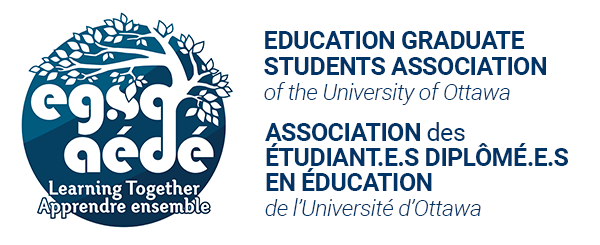The Student Speaker Series provides students an opportunity to practice their presentation skills and share their ideas with their peers. Students may practice presenting for an upcoming conference, defense, or share other ideas (e.g., methodology, epistemology, theoretical framework) with their peers.
Students are invited to be part of the audience to learn from their peers and provide constructive feedback to the presenters. Sessions will be advertised via the EGSA-AÉDÉ newsletter, Facebook page and Twitter. We look forward to seeing you all there!
Presenters:
1:00 PM : Rebecca Hogue
1:30PM : Billie Jane Hermosura
2:00 PM : Discussion
Date: April 11,, 2018 1PM
Location: LMX 477
(Please note, abstracts are presented in the language in which they are received)
Patient perspectives on health literacy – Learning from ePatient blogs (Rebecca Hogue, PhD Candidate)
Patients who are actively involved in their personal healthcare sometimes self-identify as ePatients, which has been used to describe “individuals who are equipped, enabled, empowered and engaged in their health and health care decisions” (Ferguson, 2009). When defining health literacy, The National Academies of Sciences, Engineering, and Medicine (2004) define health literacy as “the degree to which individuals have the capacity to obtain, process and understand basic health information and services needed to make appropriate health decisions” (p.16). Health literacy has been defined and addressed from the perspective of healthcare professionals and organization, but has not been address from an ePatient perspective. In this presentation, I outline a framework of health literacy that I, as an ePatient, developed throughout treatment for breast cancer. The ePatient health literacy framework helps to elucidate the things that patients of critical illness need in order to learn to live with illness.
Exploring Dietitians’ Perceptions of Leadership Skills: A Pilot Study (Billie Jane Hermosura, PhD student)
Billie Jane explores the use of critical incident technique (CIT), and its feasibility in conducting health workforce research. CIT was developed during World War II by Flanagan (1954) to analyze specific well-defined critical situations. This method continues to be used in different research settings. For example, in health professions research CIT can be used where direct examination of participants can help to better understand their professional roles (Schmidt-Huber, Netzel, & Kiesewetter, 2017). In this pilot study, an explorative design employing CIT will be used to identify dietitians’ perceptions on developing leadership competence in dietetics education.
